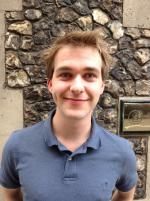

Features
20 questions with… Sam Bowman
Sam Bowman answers 20 questions on life, sustainability and everything.
Sam Bowman is research director at libertarian think tank Adam Smith Institute and will participate to the retail debate during Sustainable September, Blue & Green Tomorrow’s month-long sustainability celebration.
Bowman will argue in favour of the motion “Free trade trumps fair trade in helping developing economies”, suggesting that fairtrade does not play a crucial role in helping developing countries. Tickets for the event are available here.
We want the world to be as blue and green tomorrow as it was yesterday. What’s your mission?
I’ve never really thought about it. Personally I guess my mission is to do lots of interesting things and have lots of memorable experiences with people I like. Professionally it’s probably to help make free market libertarianism a more intellectually robust and popular idea (and hopefully to get rich in the process).
When you were a child, what did you want to be when you grew up?
A detective.
How would your friends describe you?
I asked them and they just laughed at me.
What was your ‘road to Damascus moment’ in terms of sustainability?
I am still yet to have one. I don’t really understand the idea of sustainability – if it is for us to be able to keep doing something the same way forever I don’t see that as being very important, since it’s likely that we won’t keep doing many things the way we do them now in the future.
Who or what inspires you?
People who come up with original ideas, and people who hold truly unpopular opinions despite social intolerance.
What really grinds your gears?
Hard grammar/spelling prescriptivism.
Describe your perfect day.
Most of my joys in life come from eating delicious food with friends, so I’d probably like to have something like a 100-course tasting menu at Noma in Copenhagen with some buddies.
What do you see when you look out your window at home?
A basketball court and a little green area with a rose bush and a “Caution Thorns” sign in front of it. In the distance is Battersea Power Station, one of my favourite buildings.
What do you like spending your money on?
Food, beer, and unitasker household appliances.
What’s your favourite holiday destination?
Belgium (only Flanders, and not Brussels). The beer, towns and people are all very pleasant. I also like going to America quite a lot.
What’s your favourite book?
1984 by George Orwell.
What’s your favourite film?
Ferris Bueller’s Day Off.
You’re made prime minister. What’s the first thing you do?
I would give the Bank of England a new mandate to target the level of Nominal GDP along a 5% growth path. After that I’d open the borders fully to immigration and abolish the entire planning system.
If you were stuck on a desert island, which famous person would you like to be stuck with and why?
Miranda Kerr because she’s quite cute.
What was the best piece of advice you have ever been given? And the worst?
“Never waste a good mirror.”
What would you like to be doing five years from now?
Probably something involving making money. Most people make money before they become tedious ideologues, but I’m doing things the other way round (hopefully).
What’s your biggest regret?
I don’t have many significant regrets, but I suppose I wish I’d gone to a music festival while I was a student.
What one thing would you encourage readers to do to make their life more sustainable?
I would not encourage readers to make their lives more sustainable. In my experience life is more interesting and enjoyable if it is treated as a fairly short, frivolous thing, so if anything I would encourage people to be less risk-averse and less mindful of the long term.
What’s the one idea that you think could change the world for the better?
The idea of complexity. Jonah Lehrer describes Popper’s idea of complexity in a nice way: “Karl Popper, the great philosopher of science, once divided the world into two categories: clocks and clouds. Clocks are neat, orderly systems that can be solved through reduction; clouds are an epistemic mess, highly irregular, disorderly, and more or less unpredictable. The mistake of modern science is to pretend that everything is a clock, which is why we get seduced again and again by the false promises of brain scanners and gene sequencers. We want to believe we will understand nature if we find the exact right tool to cut its joints. But that approach is doomed to failure. We live in a universe not of clocks but of clouds.”
I think that applies to society and the economy, as well as nature.
What’s your favourite quote?
“Candy is dandy but liquor is quicker.”
Further reading:
Introducing: Sustainable September
Tickets on sale for Blue & Green Tomorrow’s Sustainable September events
Ethical consumerism delivering ‘profitable growth’, says market research
Sustainable September: Retail Debate to be held at Royal Geographical Society


 Environment12 months ago
Environment12 months agoAre Polymer Banknotes: an Eco-Friendly Trend or a Groundswell?

 Features11 months ago
Features11 months agoEco-Friendly Cryptocurrencies: Sustainable Investment Choices

 Features12 months ago
Features12 months agoEco-Friendly Crypto Traders Must Find the Right Exchange

 Energy11 months ago
Energy11 months agoThe Growing Role of Solar Panels in Ireland’s Energy Future
















